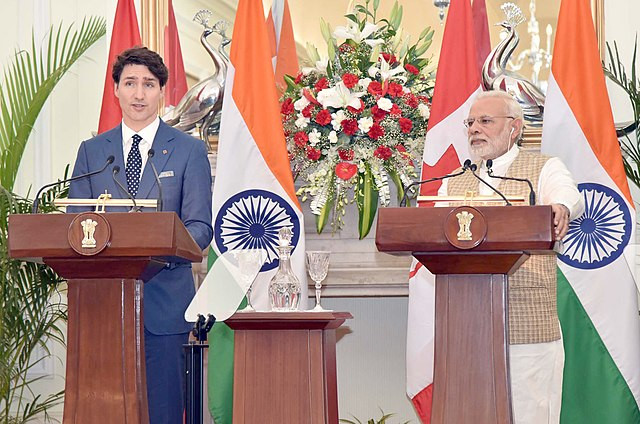Tensions between Canada and India reached a new low on Monday as Canada expelled six top Indian diplomats, including the high commissioner, linking them to the murder of Sikh separatist leader Hardeep Singh Nijjar. The expulsions followed accusations that Indian agents were involved in targeting Indian dissidents in Canada, including incidents of murder, harassment, and other violent acts. In retaliation, India expelled six Canadian diplomats, further deepening the diplomatic rift between the two nations.
Canadian Prime Minister Justin Trudeau's government took the bold step after claiming to have "clear and compelling evidence" that Indian government agents had engaged in clandestine activities, posing a serious threat to public safety in Canada. "This is unacceptable," Trudeau said during a press conference, emphasizing that India had made a "fundamental error" by engaging in criminal activities on Canadian soil. The evidence reportedly includes information on Indian agents using organized crime to target South Asian Canadians and interference in democratic processes.
India, for its part, swiftly dismissed the allegations as politically motivated. India's Ministry of External Affairs rejected Trudeau's claims, accusing the Canadian government of pursuing a "political agenda." In a statement, the Indian government called the accusations "preposterous" and said it was withdrawing its officials because it could not guarantee their safety in Canada. The ministry also summoned Acting High Commissioner Stewart Wheeler in New Delhi, further escalating the diplomatic standoff.
The expulsion of diplomats and the exchange of accusations between the two countries is the latest escalation in a relationship that has been deteriorating since 2022, when Trudeau initially linked Indian agents to Nijjar's assassination. Nijjar, a prominent advocate for an independent Sikh homeland known as Khalistan, was gunned down outside a Sikh temple in British Columbia in June 2022. Canada, home to the largest population of Sikhs outside of India, has seen growing tensions between pro-Khalistan activists and Indian authorities.
Mélanie Joly, Canada's Minister of Foreign Affairs, justified the expulsion of Indian diplomats, stating that it followed "great consideration" and was based on "ample, clear and concrete evidence" gathered by the Royal Canadian Mounted Police (RCMP). She added that Canada had sought India's cooperation in removing diplomatic immunity for the implicated officials but was forced to act when India refused to cooperate. "We will not sit quietly as agents of any country are linked to efforts to threaten, harass, or even kill Canadians," Joly said.
The RCMP took the unusual step of publicly disclosing details of multiple investigations into the involvement of Indian agents in "serious criminal activity" on Canadian soil. RCMP Commissioner Mike Duheme revealed that since September 2022, there had been more than a dozen credible threats against members of Canada's South Asian community, many linked to pro-Khalistan activism. "Despite law enforcement action, the harm has continued, posing a serious threat to our public safety," Duheme said, noting that Indian diplomats had used their positions to gather intelligence for use against members of the Sikh diaspora.
India has consistently denied any involvement in Nijjar's murder, calling Trudeau's allegations "absurd" and part of a deliberate smear campaign. Despite these denials, the situation has drawn international attention, particularly from the United States. Last year, the U.S. accused Indian agents of plotting to assassinate another Sikh separatist leader, American citizen Gurpatwant Singh Pannun, on U.S. soil. In November, a U.S. indictment accused an Indian national of conspiring to kill Pannun at the behest of an unnamed Indian government official. These accusations have further strained India's relationships with its Western allies.
In the aftermath of the latest developments, experts say relations between Canada and India may be damaged beyond repair for the foreseeable future. Fen Osler Hampson, a professor of international relations at Ottawa's Carleton University, described the situation as a "major rupture" in bilateral ties. "It is hard to see at this juncture that a return to normalcy will happen any time in the foreseeable future," Hampson said.
India and Canada, both members of the Commonwealth, have shared trade and diplomatic ties for decades. However, the growing tensions over the treatment of Sikh separatists, many of whom enjoy public sympathy within the Sikh diaspora, have tested the limits of their relationship. With the latest tit-for-tat expulsions, it seems the two nations are moving further apart rather than seeking resolution.
Trudeau emphasized that Canada is not seeking a diplomatic confrontation but will not tolerate foreign interference in its internal affairs. "We continue to ask that the Indian government support the ongoing investigation in the Nijjar case, as it remains in both our countries' interest to get to the bottom of this," Trudeau said, urging India to cooperate with Canadian law enforcement. Whether India will engage remains uncertain, as the geopolitical consequences of these allegations continue to unfold.




